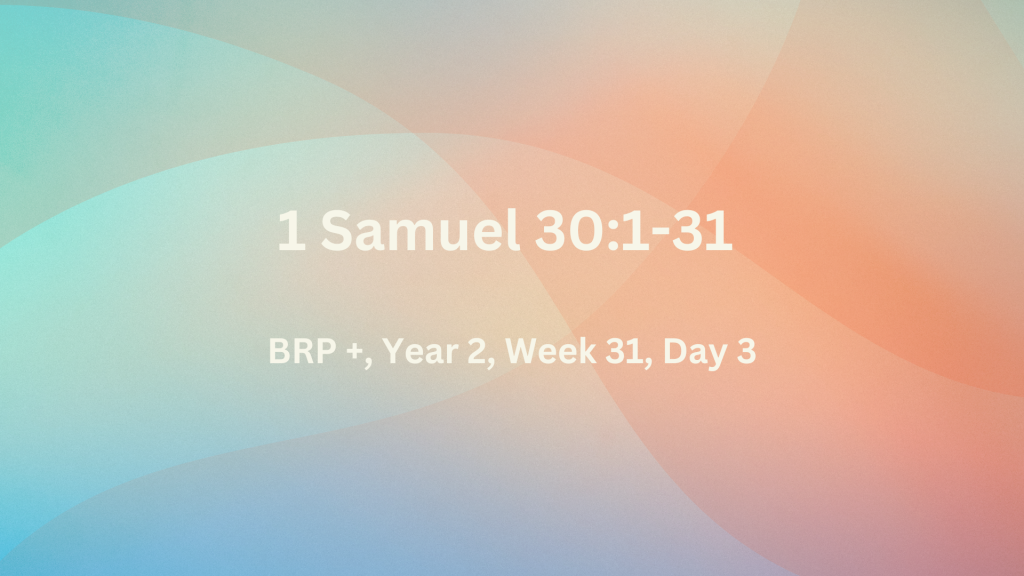1 Samuel 30:1-31
Q.1. What happened to the families at Ziglag? How did the men react? What did David do? How did he know what to do? Did all David’s troops pursue the enemy? – (1 Sam.30:1-10)
During their week’s absence, the Amalekites had raided – … 1 Ziklag and burned it with fire; 2 and they took captive the women and all who were in it, both small and great, without killing anyone, and carried them off and went their way (1 Sam.30:1-2). David and his men were tired, but soon, in their grief, the men turned against David. – and they were talking of stoning him … but (great man that he was) David found strength in the Lord his God (1 Sam.30:6). He took command, and sought the Lord’s will, with the support of Abiathar and his ephod (1 Sam.30:7). God told him to – 8 … Pursue, for you will surely overtake them, and you will surely rescue all (1 Sam.30:8). We no longer need an ephod today, because we can rely on the direction of the Holy Spirit, and the principles in the Word of God (c.f. Ps.119:105; Jn.14:25-26; 15:26; 16:13-14; 2 Cor.5:7; 2 Pet.1:4, 20-21). David, with six hundred of his men, set off in pursuit. When they came to the Besor Ravine in the Negev – two hundred were too exhausted to cross the ravine (1 Sam.30:10). David left them there to look after their supplies, while he and four hundred continued the pursuit (1 Sam.30:10).
Q.2. Who was the Egyptian man they revived? What did they discover from him? On what condition would he lead them? What was the outcome from the battle? – (1 Sam.30:11-20)
Not long after, David and his men came across an Egyptian. They fed him, brought him back to health, and discovered that he was a sick servant who had been one of the Amalekite raiders (1 Sam.30:11-14). He agreed to take them to the Amalekites, on the condition that they preserve his life (1 Sam.30:15). The Amalekites – 16 … were spread over all the land, eating, and drinking and dancing because of all the great spoil that they had taken from the land of the Philistines and from the land of Judah (1 Sam.30:16). In the ensuing battle – 17 David slaughtered them from the twilight until the evening of the next day; and not a man of them escaped, except four hundred young men who rode on camels and fled (1 Sam.30:17). With God’s help – 18 David recovered all that the Amalekites had taken and rescued his two wives. 19 But nothing of theirs was missing, whether small or great, sons or daughters, spoil, or anything that they had taken for themselves; David brought it all back (1 Sam.30:18-19). God had been true to His promise. The spoils of battle belonged to David.
Q.3. Did all the men want to share the spoils of battle? Why did David resist them? What principle did he establish? How did David show his generosity to his supporters? – (1 Sam.30:21-31)
Upon returning to the two hundred men, some of the victors only wanted to return their families, but none of the spoils (1 Sam.30:21-22). This was a watershed moment. David intervened by reminding the men that God had protected them and given them the victory (1 Sam.30:23). He declared – 24 … “as his share is who goes down to the battle, so shall his share be who stays by the baggage; they shall share alike.” 25 So it has been from that day forward, that he made it a statute and an ordinance for Israel to this day (1 Sam.30:24-25). This principle applies to ministry and missions. All who contribute in the ministry share in the spoils of battle (c.f. 1 Cor.12:18-27). It applies to marriage, where the one at the coalface of ministry and the one caring for the family share equally in the rewards at the Judgment Seat of Christ, because marriage is all about oneness (c.f. Mt.19:5-6). Upon returning, David shared the plunder with – the elders of Judah who were his friends … (1 Sam.30:26). He spread his blessings generously with more than a dozen towns, and – in all the other places where David and his men roamed (1 Sam.30:30). In this way, David maintained his reputation amongst people of Israel. Little would he have known that his circumstances would change dramatically with the death of Saul.

